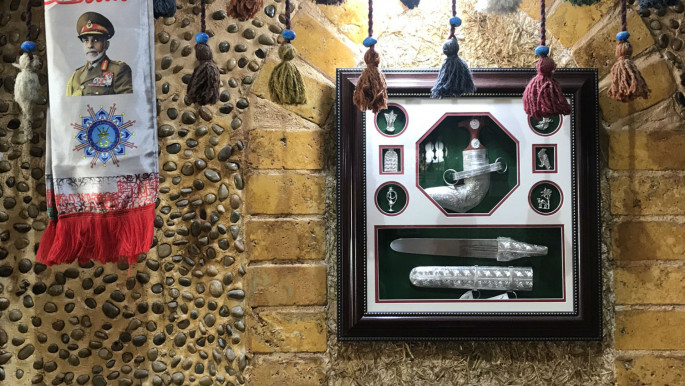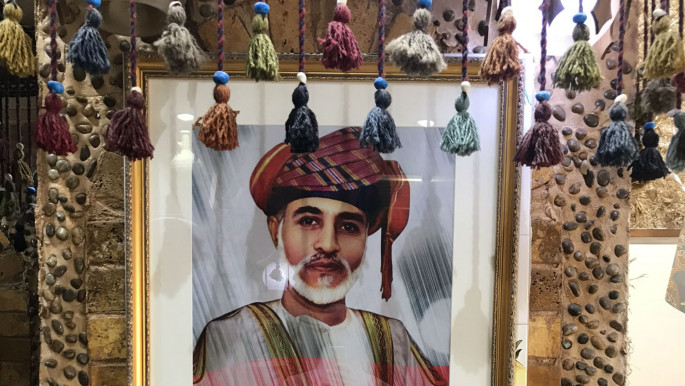
Al-Wali: A taste of Oman in the heart of Wales
One course meal for one, around £15
As more and more Omanis venture overseas for study or work, there is every chance that more restaurants such as Al-Wali will open overseas - serving expatriates wishing for a taste of home, and others who simply want to experiment with the country's under-publicised delicacies.
This appears to be the idea behind Al-Wali in the Welsh capital, Cardiff, which boasts a large population of students from the Gulf.
Al-Wali is situated on a section of City Road that could be described as Cardiff's Arabic quarter. Lebanese restaurants, shisha cafes and money exchanges line the street, along with the type of loud and colourful convenient stores found across the Gulf - selling anything from sacks of rice to paintings of horses.
Nestled among them is Al-Wali, a small piece of Oman in the Welsh capital.
The restaurant's interior is similar to many found in Oman. Seating arrangements are simple but dignified, with the dim lighting adding to the atmosphere.
The room is replete with traditional Omani handicrafts and ornaments, including the khanjar - a small ornamental dagger that represents important virtues for men in the sultanate.
The weapon takes pride of place on the country's flag and the green, red and white banner can be seen boldly hanging from Al-Wali's adobe-style walls.
Omani cuisine is well represented on the menu, which also borrows slightly from the food of the Levant with the inclusion of stuffed vine leaves and falafel.
The mains are much more representative of Oman and the Gulf region as a whole. Kabsa (rice cooked in broth with carrots) and meat is on the menu, which will likely satisfy homesick students.
Other favourites of the region also feature here, including Harees (lamb or chicken cooked with spiced, smashed barley) and Tharid (a meat stew served on soaked flat bread).
I am told that among the most popular dishes on the menu is the fresh grilled sea bass, which represents the sultanate's pride as a seafaring nation. It also underlines Omanis' passion for seafood - something that can be seen in fish souqs across the sultanate early every Friday morning.
 |
| Traditional Omani artefacts cover the walls of Al-Wali [Paul McLoughlin] |
For me, there's one dish that has been on my mind during my whole stay in Cardiff, and my journey up to Wales - Shuwa.
It represents Omani cuisine at its best, and although the Bedouin of other countries in the Middle East cook meat using a similar method (think of Zarb in Jordan) the spice mix is typically Omani and unique.
Preparing Shuwa is an ancient and much-loved Omani pastime, representing Omanis' deep-rooted sense of tradition, hospitality and communalism.
Shuwa is also, essentially, a dish of the village. It is usually cooked during holidays and feast days - or even special weekends - when Omanis who work in the cities return to their ancestral homes and spend time with their extended families.
It is prepared by marinating meat (usually goat, lamb or camel) in a spicy sauce with the carcass wrapped in banana leaves or date palms. Men from the village then dig a pit in the ground and fill the bottom with burning charcoal. The meat is then concealed in a protective fibre parcel and placed on the ambers and buried in sand.
For two to three days the meat slowly roasts underground, cooking in its juices. After much patience and anticipation, the Shuwa is then brought to the surface and enjoyed with the family.
As can be imagined, the meat is extraordinarily tender and juicy. The taste is a wallop of flavours, including charred meat, chili and more earthy spices. It's like no meat dish you have ever tasted and it will have you craving more, as I have been for the past four years since I left Oman.
The traditional dish is served with rice or bread, salad and a spicy chili sauce that manages to be both mild and hot, soothing and punchy, at the same time.
 |
| Sultan Qaboos watches over diners enjoying their meals [Paul McLoughlin] |
I understand that the Shuwa served at Al-Wali is not cooked underground but is slowly roasted with the same care and blend of spices as the traditional method, making it a true representation of the dish. Likewise authentic are the portions here, representing Omanis' generosity towards guests.
Mountain Dew is a modern popular addition to the Omani diet. The American soft drink now has a legendary status in the sultanate with many theories behind its success.
Also served is Chai Karak, a drink popular in the Gulf - similar to Chai Masala - black tea with cardamom and other spices, served with a generous amount of sweet condensed milk.
Al-Wali manages to serve hearty, delicious food in an environment that mirrors the aesthetics and tastes of a true Omani dining experience.
For those who have lived and loved Oman, Al-Wali will have you pining for the sultanate and more of its delicious, under-the-radar cuisine.
Halal: Yes
Alcohol served: No
Follow Paul McLoughlin on Twitter: @PaullMcLoughlin
Yalla, let's eat: Click here to read more of The New Arab's food reviews:





 Follow the Middle East's top stories in English at The New Arab on Google News
Follow the Middle East's top stories in English at The New Arab on Google News


